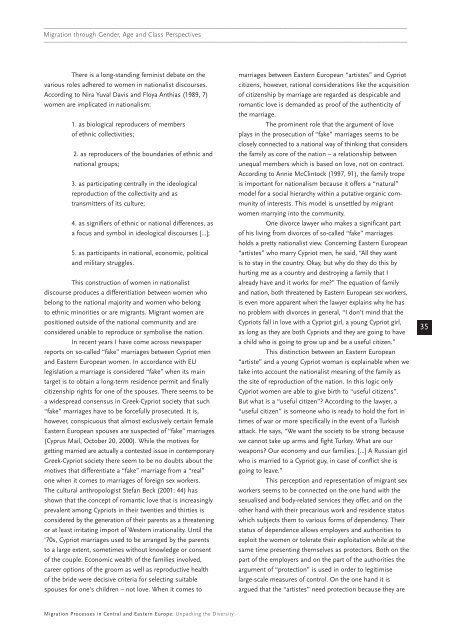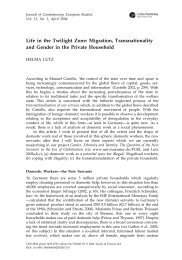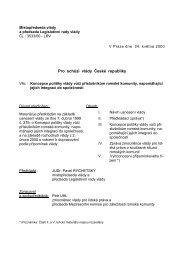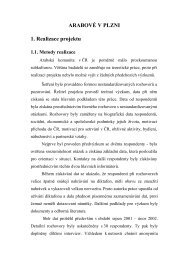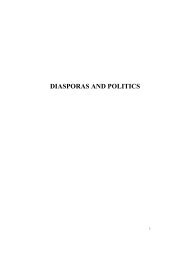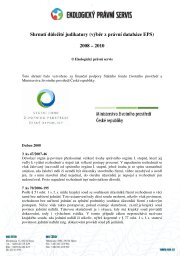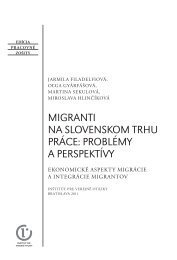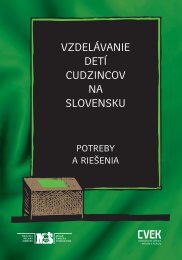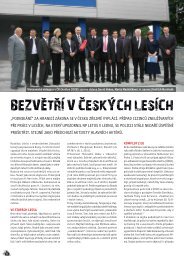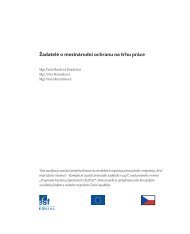Migration Processes in Central and Eastern Europe - Multiple Choices
Migration Processes in Central and Eastern Europe - Multiple Choices
Migration Processes in Central and Eastern Europe - Multiple Choices
Create successful ePaper yourself
Turn your PDF publications into a flip-book with our unique Google optimized e-Paper software.
———————————————————————————————————————————————————————————————<br />
<strong>Migration</strong> through Gender, Age <strong>and</strong> Class Perspectives<br />
———————————————————————————————————————————————————————————————<br />
There is a long-st<strong>and</strong><strong>in</strong>g fem<strong>in</strong>ist debate on the<br />
various roles adhered to women <strong>in</strong> nationalist discourses.<br />
Accord<strong>in</strong>g to Nira Yuval Davis <strong>and</strong> Floya Anthias (1989, 7)<br />
women are implicated <strong>in</strong> nationalism:<br />
1. as biological reproducers of members<br />
of ethnic collectivities;<br />
2. as reproducers of the boundaries of ethnic <strong>and</strong><br />
national groups;<br />
3. as participat<strong>in</strong>g centrally <strong>in</strong> the ideological<br />
reproduction of the collectivity <strong>and</strong> as<br />
transmitters of its culture;<br />
4. as signifiers of ethnic or national differences, as<br />
a focus <strong>and</strong> symbol <strong>in</strong> ideological discourses […];<br />
5. as participants <strong>in</strong> national, economic, political<br />
<strong>and</strong> military struggles.<br />
This construction of women <strong>in</strong> nationalist<br />
discourse produces a differentiation between women who<br />
belong to the national majority <strong>and</strong> women who belong<br />
to ethnic m<strong>in</strong>orities or are migrants. Migrant women are<br />
positioned outside of the national community <strong>and</strong> are<br />
considered unable to reproduce or symbolise the nation.<br />
In recent years I have come across newspaper<br />
reports on so-called “fake” marriages between Cypriot men<br />
<strong>and</strong> <strong>Eastern</strong> <strong>Europe</strong>an women. In accordance with EU<br />
legislation a marriage is considered “fake” when its ma<strong>in</strong><br />
target is to obta<strong>in</strong> a long-term residence permit <strong>and</strong> f<strong>in</strong>ally<br />
citizenship rights for one of the spouses. There seems to be<br />
a widespread consensus <strong>in</strong> Greek-Cypriot society that such<br />
“fake” marriages have to be forcefully prosecuted. It is,<br />
however, conspicuous that almost exclusively certa<strong>in</strong> female<br />
<strong>Eastern</strong> <strong>Europe</strong>an spouses are suspected of “fake” marriages<br />
(Cyprus Mail, October 20, 2000). While the motives for<br />
gett<strong>in</strong>g married are actually a contested issue <strong>in</strong> contemporary<br />
Greek-Cypriot society there seem to be no doubts about the<br />
motives that differentiate a “fake” marriage from a “real”<br />
one when it comes to marriages of foreign sex workers.<br />
The cultural anthropologist Stefan Beck (2001: 44) has<br />
shown that the concept of romantic love that is <strong>in</strong>creas<strong>in</strong>gly<br />
prevalent among Cypriots <strong>in</strong> their twenties <strong>and</strong> thirties is<br />
considered by the generation of their parents as a threaten<strong>in</strong>g<br />
or at least irritat<strong>in</strong>g import of Western irrationality. Until the<br />
'70s, Cypriot marriages used to be arranged by the parents<br />
to a large extent, sometimes without knowledge or consent<br />
of the couple. Economic wealth of the families <strong>in</strong>volved,<br />
career options of the groom as well as reproductive health<br />
of the bride were decisive criteria for select<strong>in</strong>g suitable<br />
spouses for one's children – not love. When it comes to<br />
marriages between <strong>Eastern</strong> <strong>Europe</strong>an “artistes” <strong>and</strong> Cypriot<br />
citizens, however, rational considerations like the acquisition<br />
of citizenship by marriage are regarded as despicable <strong>and</strong><br />
romantic love is dem<strong>and</strong>ed as proof of the authenticity of<br />
the marriage.<br />
The prom<strong>in</strong>ent role that the argument of love<br />
plays <strong>in</strong> the prosecution of “fake” marriages seems to be<br />
closely connected to a national way of th<strong>in</strong>k<strong>in</strong>g that considers<br />
the family as core of the nation – a relationship between<br />
unequal members which is based on love, not on contract.<br />
Accord<strong>in</strong>g to Annie McCl<strong>in</strong>tock (1997, 91), the family trope<br />
is important for nationalism because it offers a “natural”<br />
model for a social hierarchy with<strong>in</strong> a putative organic community<br />
of <strong>in</strong>terests. This model is unsettled by migrant<br />
women marry<strong>in</strong>g <strong>in</strong>to the community.<br />
One divorce lawyer who makes a significant part<br />
of his liv<strong>in</strong>g from divorces of so-called “fake” marriages<br />
holds a pretty nationalist view. Concern<strong>in</strong>g <strong>Eastern</strong> <strong>Europe</strong>an<br />
“artistes” who marry Cypriot men, he said, “All they want<br />
is to stay <strong>in</strong> the country. Okay, but why do they do this by<br />
hurt<strong>in</strong>g me as a country <strong>and</strong> destroy<strong>in</strong>g a family that I<br />
already have <strong>and</strong> it works for me?” The equation of family<br />
<strong>and</strong> nation, both threatened by <strong>Eastern</strong> <strong>Europe</strong>an sex workers,<br />
is even more apparent when the lawyer expla<strong>in</strong>s why he has<br />
no problem with divorces <strong>in</strong> general, “I don't m<strong>in</strong>d that the<br />
Cypriots fall <strong>in</strong> love with a Cypriot girl, a young Cypriot girl,<br />
as long as they are both Cypriots <strong>and</strong> they are go<strong>in</strong>g to have<br />
a child who is go<strong>in</strong>g to grow up <strong>and</strong> be a useful citizen.”<br />
This dist<strong>in</strong>ction between an <strong>Eastern</strong> <strong>Europe</strong>an<br />
“artiste” <strong>and</strong> a young Cypriot woman is expla<strong>in</strong>able when we<br />
take <strong>in</strong>to account the nationalist mean<strong>in</strong>g of the family as<br />
the site of reproduction of the nation. In this logic only<br />
Cypriot women are able to give birth to “useful citizens”.<br />
But what is a “useful citizen”? Accord<strong>in</strong>g to the lawyer, a<br />
“useful citizen” is someone who is ready to hold the fort <strong>in</strong><br />
times of war or more specifically <strong>in</strong> the event of a Turkish<br />
attack. He says, “We want the society to be strong because<br />
we cannot take up arms <strong>and</strong> fight Turkey. What are our<br />
weapons? Our economy <strong>and</strong> our families. […] A Russian girl<br />
who is married to a Cypriot guy, <strong>in</strong> case of conflict she is<br />
go<strong>in</strong>g to leave.”<br />
This perception <strong>and</strong> representation of migrant sex<br />
workers seems to be connected on the one h<strong>and</strong> with the<br />
sexualised <strong>and</strong> body-related services they offer, <strong>and</strong> on the<br />
other h<strong>and</strong> with their precarious work <strong>and</strong> residence status<br />
which subjects them to various forms of dependency. Their<br />
status of dependence allows employers <strong>and</strong> authorities to<br />
exploit the women or tolerate their exploitation while at the<br />
same time present<strong>in</strong>g themselves as protectors. Both on the<br />
part of the employers <strong>and</strong> on the part of the authorities the<br />
argument of “protection” is used <strong>in</strong> order to legitimise<br />
large-scale measures of control. On the one h<strong>and</strong> it is<br />
argued that the “artistes” need protection because they are<br />
35<br />
<strong>Migration</strong> <strong>Processes</strong> <strong>in</strong> <strong>Central</strong> <strong>and</strong> <strong>Eastern</strong> <strong>Europe</strong>: Unpack<strong>in</strong>g the Diversity


